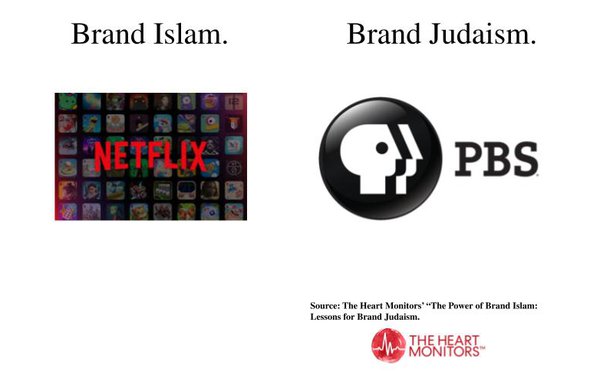
In the year since Hamas' Oct. 7, 2023 atrocious attacks and
hostage-taking of Israeli and some American civilians, I've struggled a lot with my own identity as an American Jew and had some difficult conversations with other American Jews and non-Jews about
what it means to be Jewish, to criticize how Israel has been prosecuting its wars or to support it unconditionally, as well as the overall rise in anti-Semitism here and in other countries.
I've shared my own views periodically about that, as well as the views of others, including the team at The Heart Monitors, which as been conducting some of the most sophisticated feelings-based
research and analysis on the subject.
You may recall the "Repositioning Goliath" column we
published earlier this year, laying out the ironic role reversal between Israel and pro-Palestinian forces.
advertisement
advertisement
In the period since, The Heart Monitors' Robin Lemberg has developed a more nuanced
branding analogy of the religious cultures underlying it, something she has defined as "Brand Islam" vs. "Brand Judaism." While I don't necessarily agree with that binary logic or oppositional
framework, I think Lemberg is onto something in the way she frames public perceptions -- and underlying feelings -- surrounding modern day views of them, and how and why there has been a generational
shift in the appeal of each of those brands, particularly among Millennials.
"Brand Islam is analogous to beloved brands like Apple and Netflix," she explains, noting. "It’s Apple in
that it brings together like-minded communities or “umrah” and its demonstration of consistent values in the use, development and promotion of products and events, and creating a brand
lexicon that is easily accessible, as well as offerings that especially appeal to younger, tech-savvy generations. The younger generation provides a boost of energy and coolness absent from brands
like Microsoft and PBS.
"Brand Judaism is more akin to Microsoft and PBS," she continues, noting, "Like Microsoft, it is a fact driven, business-to-business (all business
actually!) brand, enduring and traditional, staid, and in need of new ways to connect to the world. And like PBS, Brand Judaism faces the challenge of staying relevant as a brand, no
matter our content and ideas."
While Brand Islam appears to be flourishing in the aftermath of Oct. 7, 2023 -- abetted to a great extent by Israel's brutal military actions in Gaza, and more
recently, it's militaristic expansion into Lebanon and a direct confrontation with Iran -- the optics aren't helping perceptions of Brand Judaism.
"To propel Brand Judaism forward, we need a
strategy akin to Nike's tentpole approach grounded in a unified vision -- to rebuild the long-term strategy and optimize in the short term by taking the high ground," Lemberg explains, adding,
"Let’s get people to understand our belief system and present it in a way that creates common ground. After all, Judaism is at the root of Christianity and Islam, a fact that few people know,
while Jews, albeit less religious than other denominations, do understand this. This tentpole strategy revolves around creating powerful, high-impact campaigns and programs that resonate deeply with
people's emotions and aspirations, anchored in the core values of the product—in this case, Judaism itself. Many people who don’t currently relate to or even know anything about
Judaism in fact share many Judaic values. That is the hidden opportunity for Brand Judaism to compete. Unlike other religions, Jews do not recruit new members. However, we can recruit them
spiritually by demonstrating how our values are relevant."